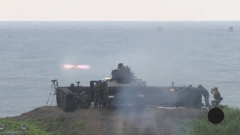TAIPEI, TAIWAN —
As the world prepares for U.S. President-elect Donald Trump’s return to the White House, Taiwan finds itself sandwiched between Washington and Beijing as it grapples with uncertainties about the outlook of U.S.-Taiwan relations and growing military pressure from China.
Trump has already picked several politicians known for their hawkish stances on China as potential nominees for his Cabinet, including Marco Rubio and Mike Waltz, but analysts say the president-elect’s comments about Taiwan on the campaign trail and in recent interviews have not offered much clarity about how he might handle one of Washington’s most delicate relationships.
“We don’t know if [Trump] means it when he wants to return the United States to a more isolationist position,” said J. Michael Cole, a Taipei-based senior fellow with the Global Taiwan Institute.
During an interview with Bloomberg Businessweek in July, Trump said Taiwan should pay the United States for defense and compared U.S. military spending on Taiwan to an insurance policy.
“I know the people very well. Respect them greatly. They did take 100% of our chip business. I think Taiwan should pay us for defense,” he said.
In October, Trump pledged to impose additional tariffs on China if Beijing were to “go into Taiwan.”
“I would say: If you go into Taiwan, I’m sorry to do this, I’m going to tax you, at 150% to 200%,” the President-elect said during an interview with The Wall Street Journal.
In his first post-election interview with NBC News on Dec. 8, Trump didn’t publicly say whether the U.S. would militarily defend Taiwan in the event of a Chinese invasion.
“I’d prefer that they don’t do it,” Trump said, adding that he has a “very good relationship” with Chinese President Xi Jinping and that the two have been communicating since last month’s election.
During his time in office, U.S. President Joe Biden has on multiple occasions said his administration would defend Taiwan if it was attacked.
Not panicking, but concerned
Some Taiwanese residents worry about what they describe as a lack of clarity from the Trump administration.
“I’m slightly concerned about how Trump’s return to the White House might affect relations between the U.S. and Taiwan because he always prioritizes U.S. interests, which makes it hard to predict how his administration might form their Taiwan policies,” Angel Chi, a 28-year-old medical worker, told VOA in a recent interview on the streets of Taipei.
Others say while Trump’s position on Taiwan seems uncertain, they do not think his administration will reduce support for Taipei.
“I still have faith in the U.S. democratic system because he can’t





